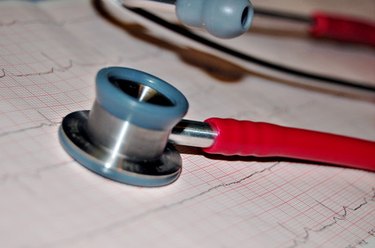
Your body responds to everything you do to it. For example, raising your arms may cause a noticeable drop in heart rate even in perfectly healthy individuals. A decrease in heart rate when raising your arms is a normal response to change in venous return. Normal cardiac physiology is responsible for this phenomenon.
Cardiac Physiology
Video of the Day
Cardiac output can be calculated as heart rate multiplied by stroke volume, according to "Harrison's Internal Medicine." This equation explains the relationship between the amount of blood pumped by the heart and heart rate. The system functions to maintain a stable cardiac output. For example, if your stroke volume increases, your heart rate drops in order to maintain a constant cardiac output. Through a number of feedback mechanisms, the cardiovascular system is capable of regulating heart rate and stroke volume in order to maintain cardiac output. These variables normally fluctuate throughout the day as your body recognizes and responds to changes.
Video of the Day
Input Equals Output
The heart is designed to accommodate changes in blood return by adjusting output. For example, if blood returning from the venous side of the circulation suddenly increases, the heart is capable of expanding its ventricles and generating even greater contractile forces in order to match output to input.
Changes In Blood Return
One way in which stroke volume changes is by increasing the return of blood to the heart. When you raise your arms, blood has a much easier time returning to the heart. Rather than working against gravity, the blood in your arms is suddenly being pulled back into the heart by gravity. In this moment, the venous return of blood to the heart is significantly increased. The heart's rebuttal to the increased blood flow is a greater stroke volume.
Compensatory Change In Heart Rate

By adjusting the return of blood to the heart, stroke volume must increase to match output with input. According to the equation, in order to maintain a stable cardiac output, heart rate must drop. This process is known as reflex bradycardia, or reflex decreased heart rate. This delicately tuned feedback system keeps you alive when these variables are altered. In this case, raising your arms produces a normal and predictable drop in heart rate.
Feedback System
The feedback mechanism for controlling heart rate involves pressure sensors in your carotid artery. This major blood vessel is the one that carries blood to your brain; you can feel your carotid pulse in your neck. This artery supplies your brain with oxygen and nutrients. The moment cardiac output changes and pressures increase or decrease in this artery, the baroreceptors in the carotid artery detect the change in pressure and respond by changing the heart rate accordingly. The heart rate is controlled by the level of adrenaline released by the baroreceptors. In the case of raising your arms, cardiac output has increased, so the release of adrenaline decreases, thus lowering the heart rate.